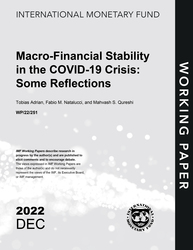
Macro-Financial Stability in the COVID-19 Crisis: Some Reflections
Macro-Financial Stability in the COVID-19 Crisis: Some Reflections
READ MORE...
Volume/Issue:
Volume 2022
Issue 251
Publication date: December 2022
ISBN: 9798400229176
$0.00
Add to Cart by clicking price of the language and format you'd like to purchase
Available Languages and Formats
| English |
Topics covered in this book
This title contains information about the following subjects.
Click on a subject if you would like to see other titles with the same subjects.
Exports and Imports , Finance , Inflation , Economics- Macroeconomics , Economics / General , COVID-19 pandemic crisis , monetary policy , financial stability , emerging markets , central bank asset , purchase program , monetary policy support , market liquidity , asset purchase , COVID-19 , Inflation , Global financial crisis of 2008-2009 , Capital flows , Financial sector stability , Global
Summary
The global financial system has shown remarkable resilience during the COVID-19 pandemic, despite a sharp decline in economic activity and the initial financial market upheaval in March 2020. This paper takes stock of the factors that contributed to this resilience, focusing on the role of monetary and financial policies. In response to the pandemic-induced crisis, major central banks acted swiftly and decisively, cutting policy rates, introducing new asset purchase programs, providing liquidity support for the banking system, and creating several emergency facilities to sustain the flow of credit to the real economy. Several emerging market central banks also deployed asset purchase programs for the first time. While the pandemic crisis has underscored the importance of policies in preventing calamitous financial outcomes, it has also brought to the fore some unintended consequences of policy actions—in particular, of providing prolonged monetary policy support and applying regulation to specific segments of the financial system rather than taking a broader approach—that could undermine financial stability in the future.



